

Affiliate Program. Locus Online: The Website of The Magazine of the Science Fiction & Fantasy Field. THUMBS DOWN AGENCY LIST. Contact Us Below, in alphabetical order, is a list of the literary agencies (not all of them currently active*) about which Writer Beware has received the largest number of complaints over the years, or which, based on documentation we’ve collected, we consider to pose the most significant hazard for writers.

Find literary agents and publishers with our free database. LITERARY AGENTS. IntroductionDishonest AgentsAmateur, Marginal, and Incompetent AgentsTelling Questionable From ReputableAgents Who Are Also PublishersAdditional CautionsOne Last, Very Important ThingLinks Introduction There’s conflicting wisdom on the subject of whether or not a writer needs a literary agent for first-time publication by a traditional publisher.

Many professional writers (and some how-to-get-published books) will tell you that you should make your first sale yourself, and only then, contract in hand, go looking for an agent to close the deal. “Established agents are reluctant to represent first-timers,” they’ll tell you, or “The kind of agent you can get before you’ve published anything isn’t the kind of agent you’d want.” The Civitas Book Review Program. Story Cartel. Ten Author Websites That Really do the Business - The Writing Platform.
Simon Appleby, director of digital agency Bookswarm, highlights ten websites that do their authors justice on the web.
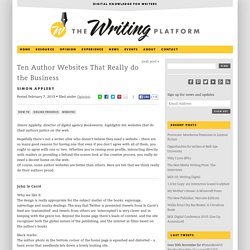
Hopefully there’s not a writer alive who doesn’t believe they need a website – there are so many good reasons for having one that even if you don’t agree with all of them, you ought to agree with one or two. Whether you’re raising your profile, interacting directly with readers or providing a behind-the-scenes look at the creative process, you really do need a decent home on the web. Of course, some author websites are better than others. Three Book Cover Typography Tips. As a cover designer and author, I get the pleasure of meeting many different kinds of writers.

Some are just starting out on their publishing journey, others are seasoned professionals who can and do often write entire novels in a month. And those same novels go on to become New York Times best sellers. Really. Besides their packed production schedules and polished prose, what sets apart the newbies from the pros? I’ve found it to be really only one thing: branding. How To Make an Awesome Video » The Kickstarter Blog. If you’re like us, the first thing you do when visiting a project page is click play.

A video is by far the best way to get a feel for the emotions, motivations, and character of a project. It’s a demonstration of effort and a good predictor of success. Projects with videos succeed at a much higher rate than those without (50% vs. 30%). How to Get Your Book Reviewed. Self-publishing a book: 25 things you need to know. Note to readers: I originally published the article back in 2008 and have updated it a few times, most recently on June 13, 2012.
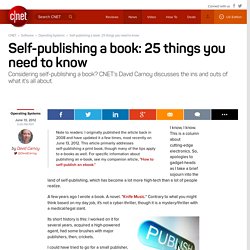
This article primarily addresses self-publishing a print book, though many of the tips apply to e-books as well. For specific information about publishing an e-book, see my companion article, "How to self-publish an ebook. " I know, I know. About ISBN. "ISBN" stands for "International Standard Book Number".
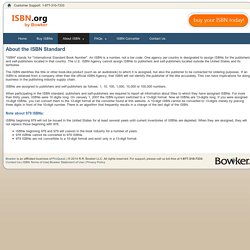
An ISBN is a number, not a bar code. One agency per country is designated to assign ISBNs for the publishers and self-publishers located in that country. The U.S. ISBN Agency cannot assign ISBNs to publishers and self-publishers located outside the United States and its territories. The ISBN identifies the title or other book-like product (such as an audiobook) to which it is assigned, but also the publisher to be contacted for ordering purposes.
AuthorBuzz. How to Get Your Book Reviewed. How to Get Your Book Reviewed. Gaiman on the future of publishing: be dandelions! The audience for Neil Gaiman's talk on the future of publishing at the London Book Fair apparently greeted his talk with stony hostility.
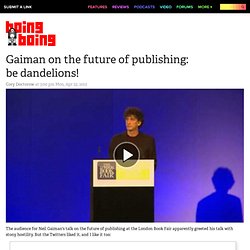
But the Twitters liked it, and I like it too: Going against a column yesterday in which Booksellers Association chief executive Tim Godfray argued that Amazon was the "foe", and has "the ability to destroy the book trade as we know it", Gaiman believes that "Amazon, Google and all of those things probably aren't the enemy. The enemy right now is simply refusing to understand that the world is changing". The novelist went on to urge the assembled publishers to be more like dandelions – an analogy he stole, he said, from Cory Doctorow. "Mammals spend an awful lot of energy on infants, on children, they spend nine months of our lives gestating, and then they get two decades of attention from us, because we're putting all of our attention into this one thing we want to grow. Here's that dandelion article he's talking about.
(Thanks, Neil) New York City-based, freelance editors/book doctors/ghostwriters. Bowker: Number of self-published books up 287% since 2006. In a new report on self-publishing, Bowker — the company that handles ISBNs (book identifier codes) and other bibliographic info for books published in the U.S. — says that the number of print and ebooks self-published annually is up by 287 percent since 2006 and now totals over 235,000 titles.
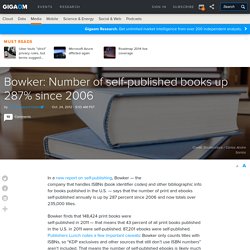
Bowker finds that 148,424 print books were self-published in 2011 — that means that 43 percent of all print books published in the U.S. in 2011 were self-published. 87,201 ebooks were self-published. Hugh Howey: Self-publishing is the future — and great for writers. The story of self-publishing is Jan Strnad, a 62-year-old educator hoping to retire in four years.
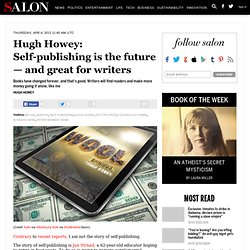
To do so is going to require supplemental income, which he is currently earning from his self-published novels. In 2012, Jan made $11,406.31 from his work. That’s more than double what he made from the same book in the six months it was available from Kensington, a major publisher. Self-publishing a book: 25 things you need to know. The Most Successful Self-Published Sci-Fi and Fantasy Authors.